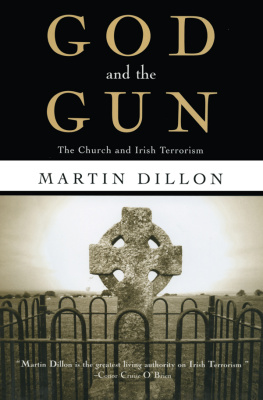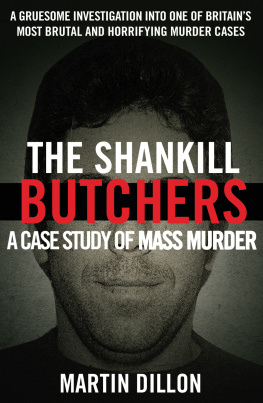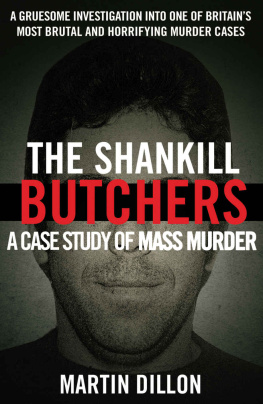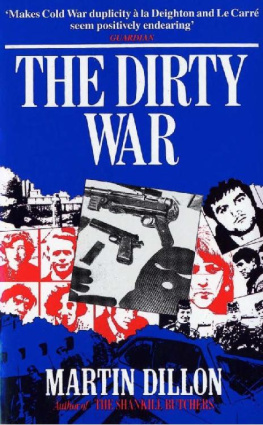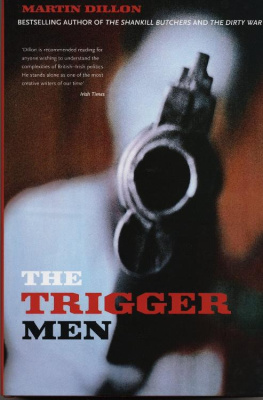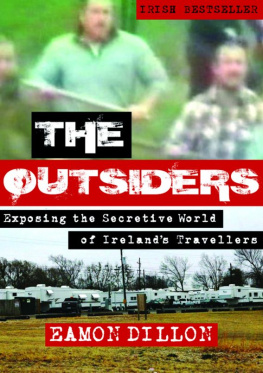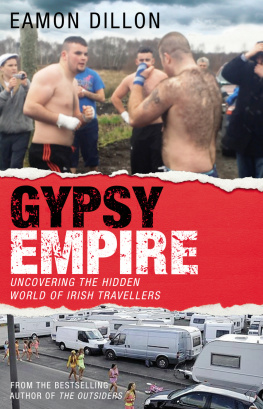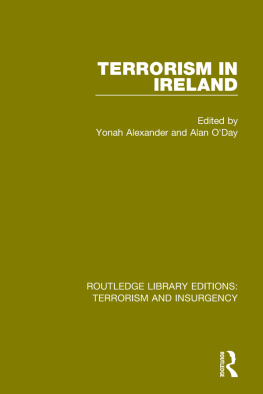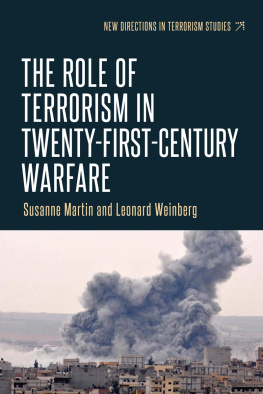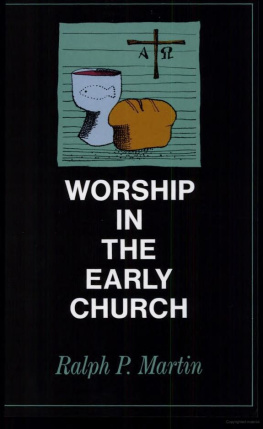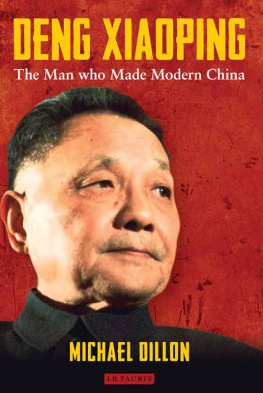Published in the United States of America in 1998 by
Routledge
711 Third Avenue, New York, NY 10017
2 Park Square, Milton Park, Abingdon, Oxon OX14 4RN
Routledge is an imprint of the Taylor & Francis Group, an informa business
Originally published in Great Britain in 1997 by
Orion
An imprint of Orion Books Ltd
Orion House, 5 Upper St. Martins Lane
London, WC2H 9EA
Copyright Martin Dillon 1997
All rights reserved. No part of this book may be reprinted or reproduced or utilized in any form or by any electronic, mechanical, or other means, now known or hereafter invented, including photocopying and recording, or in any information storage or retrieval system, without permission in writing from the publishers.
Library of Congress Cataloging-in-Publications Data
Dillon, Martin, 1949
God and the gun : the church and Irish terrorism / Martin Dillon,
p. cm.
Includes bibliographical references (p. ).
ISBN 0-415-92060-4 (CL)
1. Northern IrelandHistory. 2. TerrorismNorthern IrelandHistory20th Century. 3. ClergyNorthern IrelandAttitudes. 4. Northern IrelandChurch History. I. Title.
DA990.U46D54 1998
D uring the preparation of this book many people gave me their time and insights into the complexities of the conflict in Northern Ireland. Some are named in the following chapters, while others asked me to protect their identities. Many others around my life contributed by their presence and support.
I thank Anthony Cheetham for the faith he has shown in my work from the day I arrived in his offices to discuss The Shankill Butchers and The Dirty War. My editor at Orion, Jane Wood, and Hazel Orme worked on my manuscript, giving impetus and energy to the project. Gill Hess in Ireland has been a tower of strength in times of crisis. I am always indebted to my wife, Kathy, and our children, Crawford and Nadia, who have lived with the stress of the Ireland issues and have been patient, kind and understanding at all times. Kathy has always been there in moments of crisis, and fear. My eighty-six-year-old mother-in-law, Maureen Bannon, and her sister, Meta Cassidy; my parents, Gerard and Maureen Dillon, have been a constant source of support; also my uncle, Vincent Dillon, and his wife, Maureen, who were with me when this book was completed.
My friend Tim Pat Coogan, writer and historian, has been a source of encouragement, through his words and his own writings. Professor Paul Bew at Queens University, the historian A. T. Q. Stewart and the staff at the Linenhall Library in Belfast were ready to provide fascinating perspectives and much-needed assistance.
In the world of media, I found so many people willing to give of their time and expertise. Jim Campbell, Martin OHagan, Hugh Jordan and Jim McDowell of Sunday World provided answers to difficult questions. At the Belfast Telegraph, and Sunday Life, the editors, Ed Curran and Martin Lindsay, were always supportive when I was writing about difficult issues, believing that openness in journalism was important to a society in conflict.
There are people central to my life whose views constitute a valuable creative source. They include Dr Conor Cruise and his wife Maura OBrien; Colin Lewis, who provided me with a bolt-hole when I was researching this book; Susan Delaney Collier, a brilliant designer and friend; my sister, Imelda Feinberg, who suffered the tragic loss of her husband, Michael, one of the worlds leading radiologists; Ian Kennedy and his wife, Cecilia; Jane Lewis and her daughters, Sarah and Rachel, who suffered my presence during the research for this book; Roberta Levine and her son, Con, who both made Belfast an interesting city in difficult times (it was Con who ferried me to some of my interviews); Ursula and Brian McLaughlin; Stephen and Attracta Fay; Brian Garret and Michael Lynch at Elliott Duffy Garret; Mike and Mary Rose Cooney and their family, Aiden, Alex and Georgina, who were a constant source of love and support; Ronald and Soshana Appelton and their son, Michael; Howard Hastings and John Toner at the Europa Hotel in Belfast; Michael Hirst, the screen-writer, and his wife, Debbie, whose perspectives on Ireland have been valuable; Elaine, Billy and their children, Jack and Rosie; Alan Brebner and Martin Anderson in London with whom late-night conversations never lacked commitment; Michael and Jackie Finnerty; Cousins Frank and Stephen Dillon, who turned the world upside down; Roy Garland and Gusty Spence, who were incisive at all times, and particularly Roy whose insights only he could have provided; Mary Johnston, the broadcaster and journalist who makes sense out of crisis; Jimmy Nesbitt, one of my dearest friends whose very presence in my life has helped me understand the precise nature of conflict; David Malone, Susie and their family in Donaghadee; Barry Cowan, one of the best commentators ever employed by the BBC.
Other friends include Moore, Sandra and Siobhan Sinnerton; Don and Rosie Anderson; Sean Rafferty at the BBC; Ronald D. Ryan at West Kellog in Wichita. A special tribute must go to John Bach, a brilliant criminologist who enabled me to understand the history of the prison system; Des OHagan who was willing to open up his early life for me; Simon Bates, a special friend, whose friendship and analysis have been always welcome; Paddy Devlin and his wife whose hospitality is remembered by many writers; Colin and Jane at Bethanie; my cousin Philomena, her husband, Brian ONeill, and the twins; the writer and philosopher Francois Bouan; my niece Elsa and her parents, Claude and Marie-Claude Lambert; Hester Bantock Gordon; David Alyward and his wife, Monique; Neil Johnston at the Belfast Telegraph, who watched over my early days with the newspaper; and Sue Corbett at Sunday Life; Ian Thacker; and Northern Irelands leading consultant surgeon, Roy Spence; Chris, Val and Kirsty Ludlow; Bob and Fiona Crookes; Fr. Pat Buckley for his frankness; Alan Williams for his legal advice; Eilis Starr from Nenagh, Co Tipperary; Joe Higgins; Kyhan Yilmaz; Anna Scragg and Peter Benjamin.

